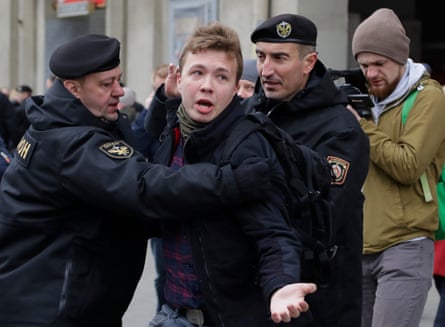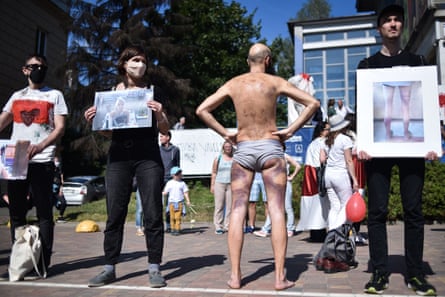[ad_1]
For a few days in May 2021, the perilous reality of being a dissenting voice in Belarus was laid bare when pilots on board Ryanair flight FR4978 bound for Vilnius in Lithuania were forced to make an emergency landing in Minsk after entering Belarusian airspace.
The pilots had been told by Belarusian air traffic control that the plane had a bomb on board. When one of them announced to passengers that the plane was being diverted to Minsk, a young male passenger leapt to his feet. He shouted that if the plane landed he would be seized by the authorities. “I am wanted there, they’ll kill me,” he screamed.
He was right, there was no bomb. Instead, after the plane landed in Minsk, the authorities swooped on Raman Pratasevich, 26, and his girlfriend Sofia Sapega, both journalists for news channels banned by the government for broadcasting reports of anti-government protests in 2020.

Mass protests broke out in Belarus after longtime ruler, Alexander Lukashenko, claimed a landslide victory in the 2020 presidential election, which many considered to have been rigged. The authorities responded to the protests with a brutal crackdown.
Pratasevich was a blogger and the former editor-in-chief of Nexta, which at the peak of the 2020 anti-government protests broadcast to two million users on Telegram and was described as the “mouthpiece of the revolution”.
Quick Guide
Transnational repression
Show
Transnational repression is the use of tactics including electronic surveillance, physical assault, intimidation and threats to family in the home country to silence people living in exile. The Guardian’s Rights and freedom series is publishing a series of articles to highlight the dangers faced by citizens in countries including the UK.
During the violent police crackdown on the protests, Nexta shared reports from countless citizen journalists on the ground. By October 2020, authorities had banned its social media channels in Belarus, declared them “extremist formations” and begun arresting Nexta’s subscribers.
The protests failed in the face of Lukashenko’s violence, but Pratasevich, who had fled Belarus in late 2019, was still placed on the Belarusian KGB’s list of wanted terrorists and faced charges of organising riots – offences that could result in a death sentence.

Sapega ran another Telegram channel, the Black Book of Belarus, which revealed the names of police and state officials allegedly responsible for violence against protesters. Pratasevich and Sapega were arrested after being pulled from the Ryanair plane and their electronic devices confiscated.
For a few days, the audacity of the Belarusian authorities – reaching into the skies and delivering fake bomb threats that deliberately landed an international flight in order to grab Pratasevich and Sapega – caused international outrage, with western leaders calling it an “act of state terrorism”.
Repression in Belarus quickly fell out of the headlines. But the crackdown on media and civil society inside and outside the country by the Lukashenko regime has continued unabated.
“When Lukashenko hijacks a western plane and lands it, this obviously is a precedent that is quite rare. The world pays attention to these sorts of things,” says Maria Ordzhonikidze, director of Justice for Journalists, Foundation for International Investigations of Crime against Media.
“Unfortunately, everything else that is going on in Belarus, what Lukashenko is doing to the Belarusian people, including journalists, is seen as an internal problem that doesn’t pose any danger to the world.”

Since the the crushing of the 2020 protests, life as a journalist in Belarus has been increasingly criminalised, with as many as 500 fleeing – mainly to neighbouring Poland and Lithuania. Inside Belarus, more than 30 reporters remain incarcerated, many charged with extremism and facing decade-long sentences.
“Independent media are a direct threat to [Lukashenko’s] power. When people learn the truth about his deeds, they may return to the streets,” says Artyom Shraibman, a Belarusian political analyst.
For those journalists who had fled, the dramatic capture of Pratasevich and Sapega is a reminder that exile is no guarantee of safety. The Belarusian government continues to hunt down Belarusian journalists living outside the country – in some cases, with the apparent help of other governments.
Hanna Liubakova, an outspoken Belarusian journalist and non-resident fellow with the Atlantic Council, a US thinktank, has studied and lived abroad since her late teens. But in 2020 she was in Belarus covering the pandemic and the presidential election and protests. As one of only a few English-speaking journalists reporting on the protests, she became a go-to expert on Belarus for western media outlets.
As her popularity grew, so did the risks. She noticed she was being watched. “It was like in the spy movies,” she says. “We were in a park and I was interviewing someone, and then there was a guy with a newspaper … Like, so obvious. We would leave, and the guy would follow us.”

Her European friends urged her to leave: “They told me I was too visible,” she says. She followed their advice and left at the end of August 2020.
In December 2021, she flew to one of the Commonwealth of Independent States countries (a regional group of post-Soviet states) for a speaking engagement. She was arrested at the airport, informed that she was on Belarus’s wanted list, and accused by the authorities of “a conspiracy to seize power”.
Since her mobile phone was not confiscated, Liubakova managed to alert her colleagues. After much effort and diplomacy – her arrest was kept under the radar of both Belarusian and Russian security forces – her release was secured and she was prevented from being extradited: “I was scared of being tortured and shown on television for propaganda purposes,” she says.

Belarusians within the EU have endured a constant stream of threats and intimidation, both to themselves and to family members living in Belarus. Zmitser Lupach, an experienced regional journalist, left Belarus for Poland after spending several days in jail on suspicion of inciting social discord in July 2021. Since he left the country, his daughter Sviatlana was arrested in 2023 and has spent the last three and a half months in detention, awaiting trial.
In Poland and Lithuania, where many Belarusian journalists fled, life still isn’t safe. Siarhey Sys, a human rights journalist and poet, says: “There are so many snitches and undercover agents in Warsaw and Vilnius. I know people in the diaspora and they know me. Then, all of a sudden, you stumble upon a stranger with short-cropped hair and wearing a tracksuit. The next thing you know, the guy starts taking pictures of something right next to you.”
Last year, a media activist publishing under the pen name Bella Fox discovered she was being watched and secretly filmed after two Lithuanians, Laurynas Ragelskis and Mantas Danielius, were detained by the police and accused of espionage on behalf of Belarus. The case of Danielius, in particular, shook the Belarusian dissident diaspora: he was a lawyer who had worked closely with many Belarusian organisations and refugees, giving them legal and business advice. In reality, he was passing information to the Belarusian KGB.

“There are many people like this in the diaspora, and you never know who is an agent, or how many people are being expelled to Belarus,” says Fox. “I had a thought that maybe Lithuania was not the safest place for me. But my asylum case is in this country, so I cannot leave.”
Since his arrest, Pratasevich has admitted guilt, apologised for helping to coordinate mass protests through Nexta, and voiced his appreciation for Lukashenko on state TV. He also gave the authorities the names of more than a dozen people involved in pro-democracy chat groups. Stsiapan Putsila, founder of Nexta and Pratasevich’s former boss, wondered whether he had been drugged before the interview.
Pratasevich was eventually released from prison and put under house arrest. His former girlfriend, Sapega, was sent to a penal colony for six years for “inciting hatred and discord” and “illegal collection and dissemination of information about private life”.

Pratasevich was eventually sentenced in May this year to eight years in prison, but later the same month was pardoned by Lukashenko. He remains under “preventive supervision”, which bans him from leaving the country.
Pratasevich’s cooperation with the regime turned many of his former allies against him. But Liubakova says that blaming Pratasevich seems like scapegoating: “He is a victim. It is Lukashenko’s regime [that] is the perpetrator. Perhaps Pratasevich is weak, but is it a crime to be weak?”
[ad_2]




